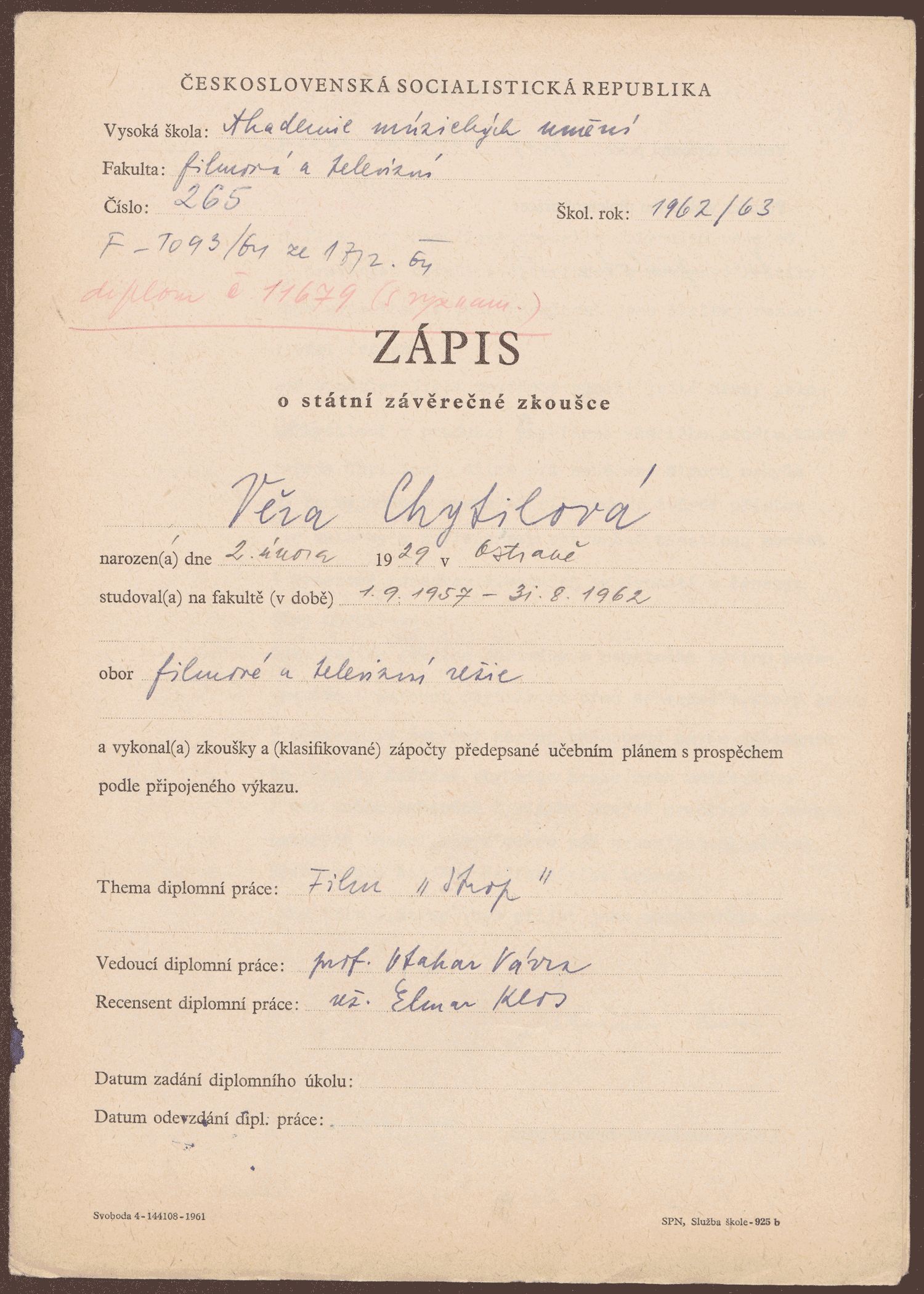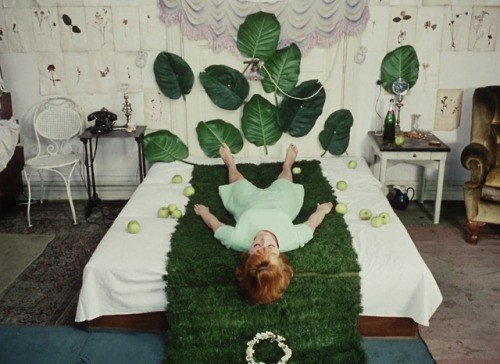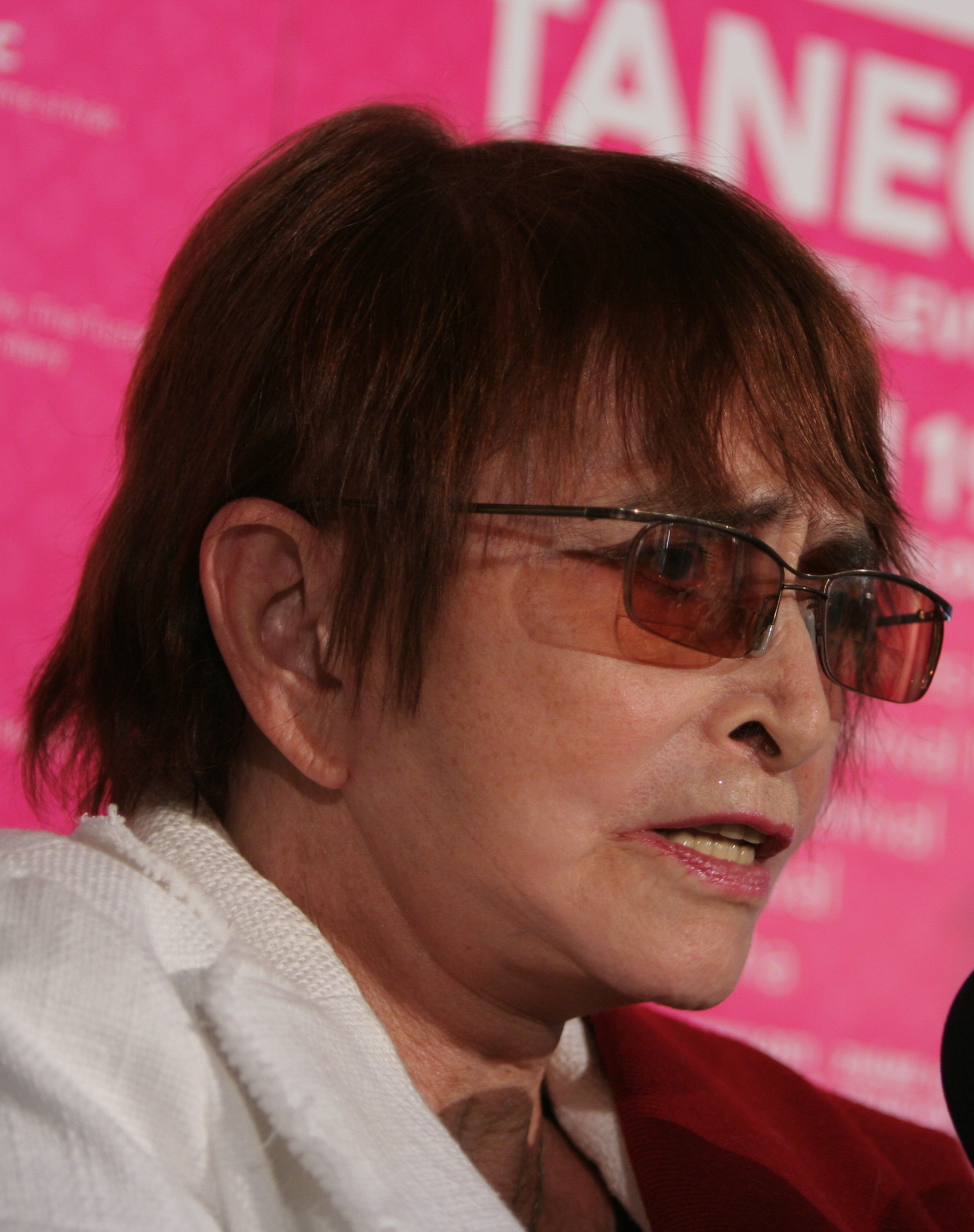1. Overview
Věra Chytilová (Věra Chytilováˈvjɛra ˈxɪtɪlovaːCzech; 2 February 1929 - 12 March 2014) was an avant-garde Czech film director and a pioneer of Czech cinema. She is recognized as one of the greatest Czech female filmmakers, known for her distinctive and often controversial artistic vision. Chytilová played a pivotal role in the Czech New Wave movement, often using experimental techniques and challenging narratives to critique societal norms and political hypocrisy. Her most renowned work, Daisies (SedmikráskyCzech; 1966), was famously banned by the Czechoslovak government in the 1960s due to its perceived anti-establishment themes and depictions of food waste, highlighting the political pressures she faced throughout her career. Despite enduring periods of censorship, international pressure allowed her to resume filmmaking, and she continued to explore themes of gender, power, and social commentary in her later works, leaving a lasting legacy on film history and artistic freedom.
2. Early life and education
Věra Chytilová's early life and extensive educational background laid the foundation for her groundbreaking career, marked by a determined pursuit of artistic expression despite initial challenges.
2.1. Childhood and education
Věra Chytilová was born on 2 February 1929, in Ostrava, Czechoslovakia. She was raised in a strict Catholic household, an upbringing that later influenced the moral questions she explored in her films. While attending college, Chytilová initially pursued studies in philosophy and architecture in Brno, Czechoslovakia's second-largest city. However, she ultimately abandoned these fields, seeking a more direct path to artistic endeavors.

At the age of 28, Chytilová was accepted into the Film and TV School of the Academy of Performing Arts in Prague (FAMU), becoming the first woman to study directing at the prestigious institution. She studied under the renowned film director Otakar Vávra and graduated in 1962. Chytilová's commitment to her artistic vision was evident early on; the screenplay for her graduation film, Strop (Ceiling), was initially rejected by her professor for its "kitsch" nature. Undeterred, she had her classmate Pavel Juráček rewrite the script to gain approval but defiantly shot her original script. This early act of defiance underscored her unwavering dedication to her unique artistic perspective.
2.2. Early career
Before embarking on her influential career as a film director, Chytilová gained diverse professional experiences. She worked as a draftswoman, a fashion model, and a photo re-toucher. She then began her involvement in the film industry at Barrandov Film Studios in Prague, where she initially worked as a clapper girl and also served in roles as a screenwriter, actress, and assistant director.
Despite her early experience at Barrandov, her initial request for a recommendation from the studios to study film production was denied. However, this rejection did not deter her, and she was later independently admitted to FAMU, marking the beginning of her formal training as a director.
3. Career and major works
Věra Chytilová's filmmaking career was characterized by audacious artistic experimentation, a relentless critique of societal issues, and significant challenges posed by political censorship. Her body of work reflects her persistent dedication to her unique vision.
3.1. Early works and the Czech New Wave
Upon her graduation from FAMU in 1962, both of Chytilová's early short films, The Ceiling (StropCzech; 1961) and A Bagful of Fleas (Pytel blechCzech; 1962), saw theatrical release across Czechoslovakia. These films were notable for their use of improvisational directing techniques, reflecting a contemporary spirit akin to the French New Wave.
In 1963, Chytilová released her first feature film, Something Different, further solidifying her presence within the burgeoning Czech New Wave.

Chytilová is most widely recognized for her highly controversial 1966 film, Sedmikrásky (Daisies), which premiered in Czechoslovakia on 30 December 1966. The film is characterized by its unsympathetic characters, a lack of continuous narrative, and an abrupt visual style. Chytilová explicitly stated that she structured Daisies to "restrict [the spectator's] feeling of involvement and lead him to an understanding of the underlying idea or philosophy." The film features two main characters, both named Marie, who embody the folly of bored, spoiled middle-class women while simultaneously revealing their own helplessness as young women objectified by a society that values them primarily as sexual objects. They justify their increasingly chaotic and destructive behavior by stating, "If the world is rotten, let us also be rotten."
Daisies was banned from screening in Czechoslovakia for over a year due to its depictions of excessive food waste, a particularly sensitive issue during a period of food shortages in the country. Chytilová fiercely combated the censorship, as her film was a biting critique of corruption and rampant consumerism. Despite governmental suppression, the film garnered international acclaim, winning the Grand Prix at the Bergamo Film Festival in Italy. Daisies not only cemented Chytilová's film career but also gained significant public notoriety both in her home country and globally. In Japan, the film's progressive and "girly" sensibility resonated with young women, particularly within the "Shibuya-kei" cultural movement, leading to its designation as the "definitive Girls' film of the 1960s."
3.2. Period of censorship and return to filmmaking
The Prague Spring of 1968, led by Alexander Dubček, brought about widespread reforms in Czechoslovakia, decentralizing the government and relaxing restrictions on the press. This period granted artists like Chytilová unprecedented creative freedoms. It was in this liberalized atmosphere that she began working on her next film, Fruit of Paradise (Ovoce stromů rajských jímeCzech; 1969), an experimental and psychedelic retelling of the story of Creation from an avant-garde, liberal perspective. However, this period of artistic freedom was short-lived. After months of tense negotiations, the Soviet Union responded to the reforms by invading Czechoslovakia with the armies of other Warsaw Pact nations, swiftly regaining control of the government. The removal of Dubček and the subsequent reversal of social reforms, coupled with the imposition of even harsher restrictions on the press and centralized government control, marked the end of the Czech New Wave. Facing such political repression, Chytilová and many other filmmakers were forced to choose between continuing their art and remaining in their home country.
Věra Chytilová was effectively banned from filmmaking for seven years. During this period, she occasionally worked under her husband's name to circumvent the ban. Her return to filmmaking was largely precipitated by international pressure. In 1976, she was invited to attend a newly established "Year of Women" film festival in the United States, but the Czechoslovak government denied her permission to attend. The festival organizers expressed interest in screening Daisies, to which Chytilová revealed that she possessed no uncensored prints of the film and was no longer permitted to make films. Although she knew of two uncensored prints in Paris and Brussels, they were not under her control.
Consequently, the festival initiated an international pressure campaign on the Czechoslovak government, petitioning on Chytilová's behalf. In response to this pressure, and driven by her strong belief in socialism, Chytilová wrote a letter directly to President Gustáv Husák detailing her career and her artistic principles. Due to the success of the pressure campaign and her direct appeal to President Husák, Chytilová was finally allowed to resume production with The Apple Game (Hra o jablkoCzech, 1976). This film was completed and subsequently screened at the Karlovy Vary International Film Festival and the Chicago International Film Festival, where it was awarded the Silver Hugo.
3.3. Later works
After the release of The Apple Game, Věra Chytilová was permitted to continue making films, though she consistently faced controversy and heavy censorship from the Czechoslovak government. Despite these ongoing challenges, she directed numerous films, including Inexorable Time (1978), Prefab Story (Panelstory aneb Jak se rodí sídlisteCzech; 1979), Calamity (1981), The Very Late Afternoon of a Faun (1983), Prague: The Restless Heart of Europe (1984), Wolf's Hole (1987), The Jester and the Queen (Šašek a královnaCzech; 1987), and A Hoof Here, a Hoof There (Kopytem sem, kopytem tamCzech; 1988).
Following the Velvet Revolution and the end of communist rule, Chytilová continued to produce films such as Tomáš Garrigue Masaryk, a Liberator (T.G.M. - osvoboditelCzech; 1990), My Citizens of Prague Understand Me (1991), and The Inheritance or Fuckoffguysgoodday (1992). Her later works include Trap, Trap, Little Trap (1998), Flights and Falls (2000), Exile from Paradise (2001), and Searching for Ester (2005).
Her final film was Pleasant Moments (Hezké chvilky bez zárukyCzech; 2006). In addition to her filmmaking, Chytilová also taught directing at FAMU, influencing a new generation of filmmakers.
4. Artistic style and themes
Věra Chytilová's artistic philosophy and cinematic style were characterized by their experimental nature and profound engagement with societal issues, often expressed through a unique visual language.
4.1. Key themes
Like many filmmakers of the Czech New Wave, Chytilová was deeply influenced by the sociopolitical climate of post-Stalin Czechoslovakia in the 1950s. She consistently sought to expose the hypocrisy of the government by presenting narratives that starkly contrasted official rhetoric. Chytilová held strong anti-consumerist views and identified herself as an individualist rather than a feminist.
A central focus of Chytilová's work was Czech society itself. Ideas of gender, sex, and power dynamics are almost invariably at the core of her films, with women frequently cast in leading roles. Through her distinctive lens, her films, while rooted in Czech society, aimed for international relevance, a characteristic shared by many Czech New Wave filmmakers.
4.2. Cinematographic style
Chytilová's films, particularly those made before the 1968 Soviet invasion of Czechoslovakia, were highly experimental, employing psychedelic colors and nonlinear editing. Works like Daisies and Fruit of Paradise are defined by their embrace of absurdism and surrealism. Her distinctive use of color filters and other experimental visual tactics were hallmarks unique to her films of the 1960s.
Chytilová developed a unique cinematographic language and style that did not rely on conventional literary or verbal structures. Instead, she utilized various forms of visual manipulations to create meaning within her films. Her personalized film style was significantly influenced by the French New Wave and Italian neorealism, combining observations of everyday life with allegories and surreal contexts.
She actively incorporated a filmic style similar to cinéma vérité to provide the audience with an external perspective on the narrative. This technique is particularly well-illustrated in her 1966 film, Daisies, where these methods create a "philosophical documentary" that diverts the spectator from emotional involvement, dismantles conventional psychological analysis, and accentuates the film's humor. Through these manipulations, Chytilová crafted a disjunctive viewing experience for her audience, compelling them to critically question the meaning and implications of her films.
5. Personal life
Věra Chytilová's personal life was deeply intertwined with her artistic and political convictions, particularly her commitment to her homeland and family amidst political turmoil. She was born in Ostrava, Czechoslovakia, on 2 February 1929.
She married Jaroslav Kučera, a cinematographer whom she met while they were both attending FAMU. Their partnership extended beyond their personal lives into their professional endeavors. Chytilová famously refused to leave Czechoslovakia after the 1968 Soviet invasion, declaring that "Making films then became a mission." During the period of Soviet occupation, when Chytilová struggled to find work as a director due to her blacklisting, she and her husband built their family home and focused on raising their children: a daughter, Tereza Kučerová (born 1964), who became an artist, and a son, Štěpán Kučera (born 1968), who followed in his father's footsteps as a cinematographer.
6. Death
Věra Chytilová died on 12 March 2014, in Prague, surrounded by her family. She passed away after a long period of battling health issues.
7. Legacy and reception
Věra Chytilová's legacy is defined by her profound impact on cinema, her unwavering artistic integrity, and her critical engagement with prevailing social and political conditions, despite facing significant opposition.
7.1. Critical reception and influence
Chytilová described herself as a "control freak" and an "overheated kettle that you can't turn down," reflecting her intense dedication and uncompromising artistic temperament. This "overheated" attitude often made it challenging for her to secure work within the Soviet Union-controlled film industry. She was known for being an active critic of the Soviet Union, stating, "My critique is in the context of the moral principles you preach, isn't it? A critical reflection is necessary." She was known to routinely cause "havoc" and "hysterical scenes" in her persistent attempts to make films that remained loyal to her vision, even under severe censorship.

Chytilová is often cited as a militant feminist filmmaker. Josef Škvorecký noted that "In a true feminist tradition Vera combined intensive intellectual effort with a feminine feeling for beauty and form." Daisies, in particular, is widely regarded as a feminist film due to its attitude and its active critique of male attitudes toward sex. However, Chytilová herself did not embrace the label of a feminist filmmaker. Instead, she believed strongly in individualism, asserting that if an individual does not believe in a particular set of conventions or rules, then it is incumbent upon that individual to challenge and break them. Her influence extends beyond her own works, shaping subsequent filmmakers through her unique approach to storytelling and her powerful voice against conformity.
7.2. Awards and recognition
Věra Chytilová received numerous accolades throughout her career, recognizing her significant contributions to cinema. These honors include:
- The Grand Prix at the Bergamo Film Festival for Daisies (1966).
- The Silver Hugo at the Chicago International Film Festival for The Apple Game (1976).
- The Ordre des Arts et des Lettres, a distinguished honor from the French government.
- The Medal of Merit, a high state honor from the Czech Republic.
- The Czech Lion award, the highest film award in the Czech Republic.
Her films also screened at prestigious international film festivals, including Wolf's Hole (1987) at the 37th Berlin International Film Festival, A Hoof Here, a Hoof There (1989) at the 16th Moscow International Film Festival, and The Inheritance or Fuckoffguysgoodday (1992) at the 18th Moscow International Film Festival.
8. Filmography
Věra Chytilová's filmography as a director, screenwriter, and contributor spans several decades, showcasing her prolific output and enduring artistic vision.
| Year | Title | Director | Screenplay | Story | Music |
|---|---|---|---|---|---|
| 1961 | The Ceiling | Yes | Yes | ||
| 1962 | A Bagful of Fleas | Yes | Yes | Yes | |
| 1963 | Something Different | Yes | Yes | Yes | |
| 1966 | "Automat Svět" in Pearls of the Deep | Yes | |||
| 1966 | Daisies | Yes | Yes | Yes | |
| 1970 | Fruit of Paradise | Yes | Yes | ||
| 1976 | The Apple Game | Yes | Yes | Yes | |
| 1978 | Inexorable Time | Yes | |||
| 1979 | Prefab Story | Yes | Yes | Yes | |
| 1981 | Calamity | Yes | Yes | ||
| 1981 | Chytilová Versus Forman - Consciousness of Continuity | Yes | |||
| 1983 | The Very Late Afternoon of a Faun | Yes | Yes | ||
| 1984 | Prague: The Restless Heart of Europe | Yes | Yes | Yes | |
| 1987 | Wolf's Hole | Yes | Yes | ||
| 1987 | The Jester and the Queen | Yes | Yes | ||
| 1988 | A Hoof Here, a Hoof There | Yes | Yes | ||
| 1990 | Tomáš Garrigue Masaryk, a Liberator | Yes | |||
| 1991 | My Citizens of Prague Understand Me | Yes | Yes | ||
| 1992 | The Inheritance or Fuckoffguysgoodday | Yes | Yes | ||
| 1998 | Trap, Trap, Little Trap | Yes | Yes | ||
| 2000 | Flights and Falls | Yes | Yes | Yes | |
| 2001 | Exile from Paradise | Yes | Yes | Yes | Yes |
| 2005 | Searching for Ester | Yes | |||
| 2006 | Pleasant Moments | Yes | Yes |